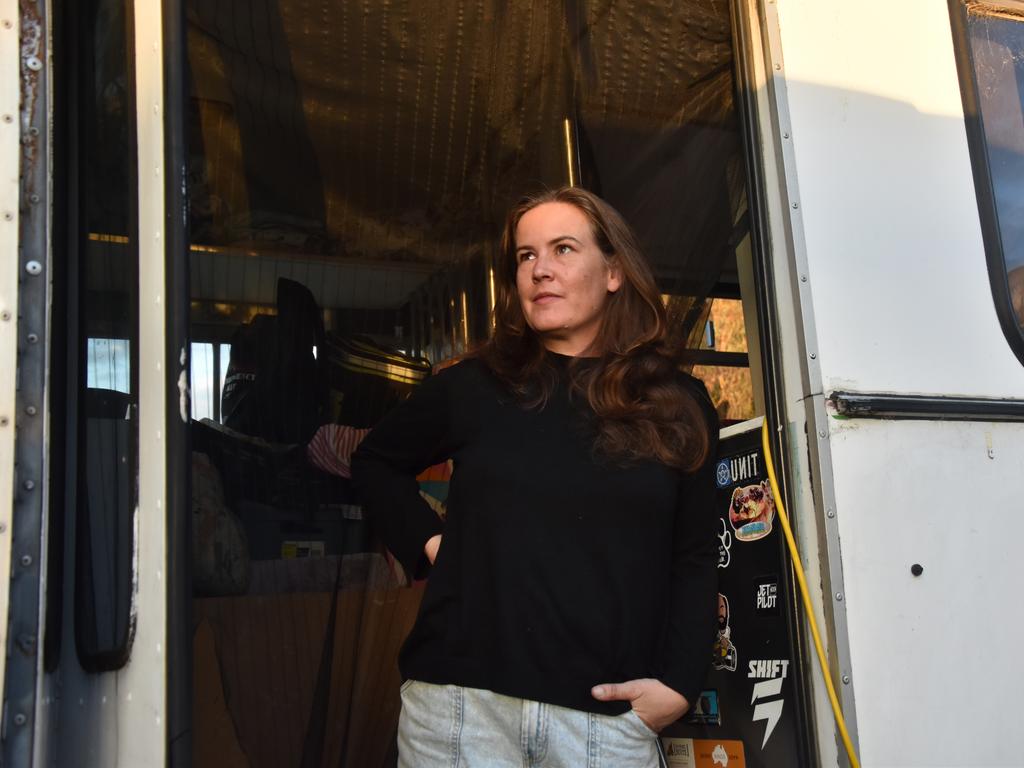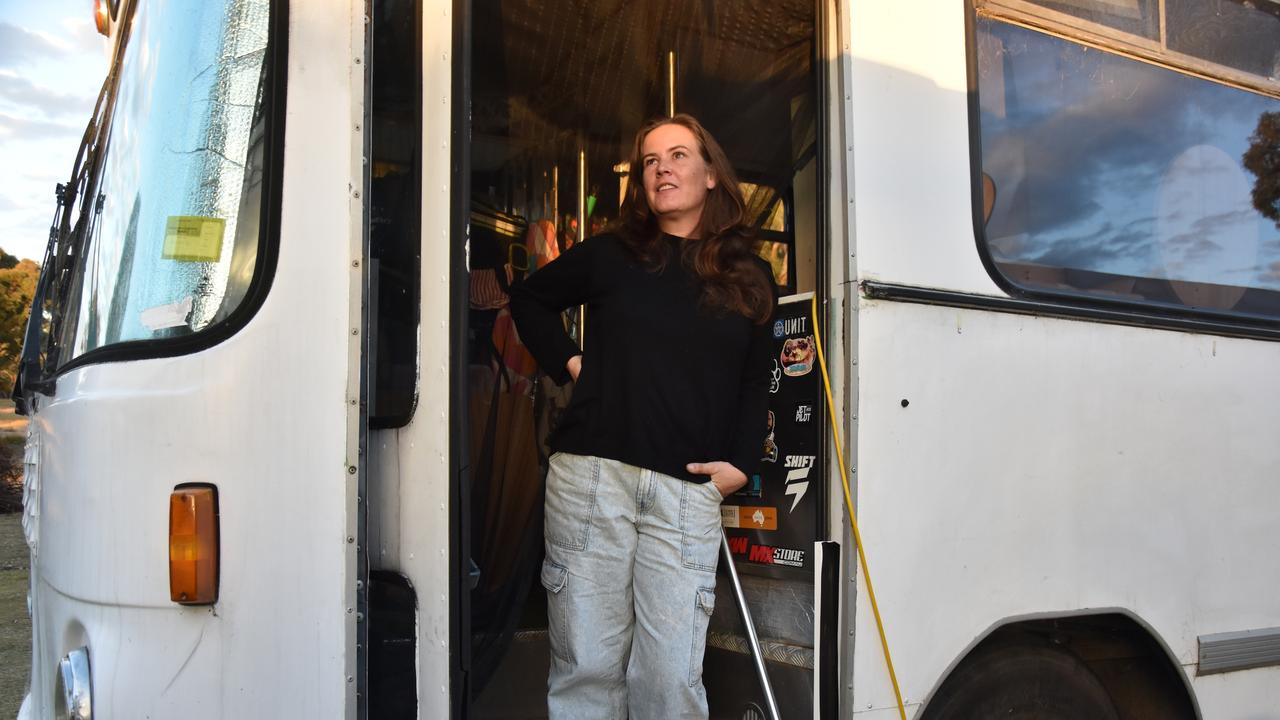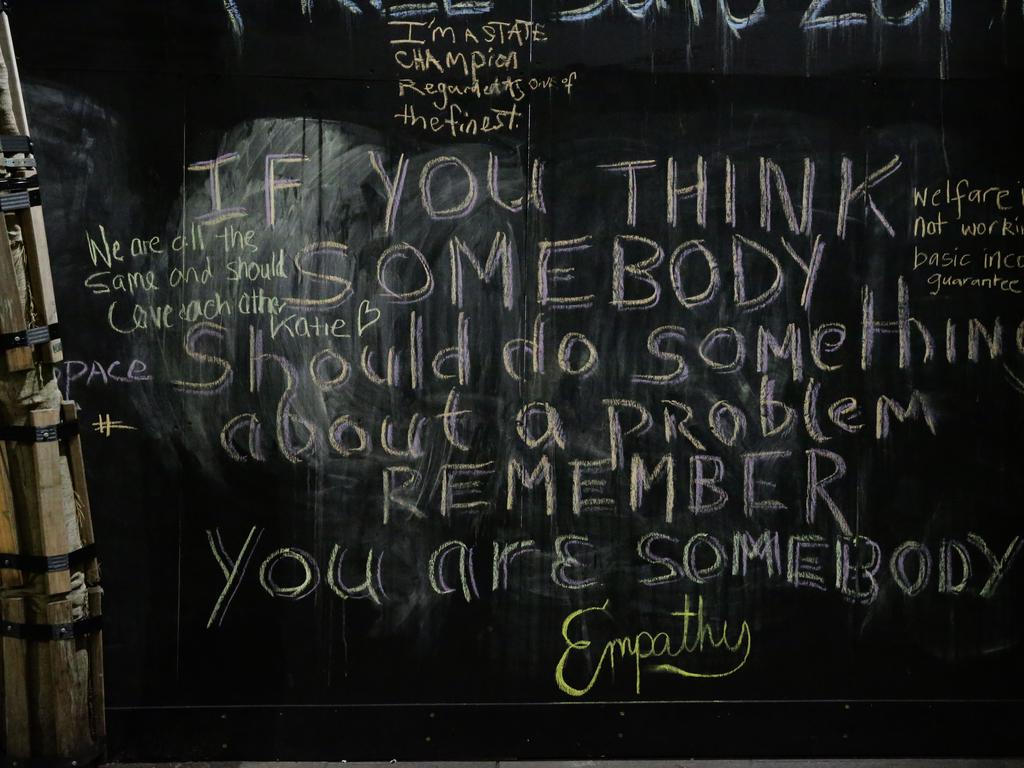How Sydney mother-of-two Emma Lenz has converted bus into home in regional Qld
A working mum of two who moved her family to rural Queensland to escape the overpriced Sydney rental market has been confronted with the reality of life without a home and her two children now living away from her.
The political white noise of our nationwide housing crisis has become deafening for a Darling Downs mother-of-two, who is all-too aware of the reality of homelessness.
Emma Lenz never envisioned her early 40s would see her living with no fixed address; having succumbed to the lack of affordability of the regional rental market.
Working on a nearby property and owning her own gardening business, Ms Lenz is still paying taxes and receiving a weekly wage but can’t afford to rent in Queensland’s Southern Downs region.
In early 2023 Ms Lenz found herself again priced out of the rental market, after having moved her family to the region six years ago in a bid to escape Sydney’s ever increasing rental market.
“I just couldn’t afford rentals in town anymore and I’ve had some bad experiences,” she said.
It was a whirlwind that sent Ms Lenz and her two teenage children temporarily living in an old caravan for a number of months.
The kindness of strangers led to Ms Lenz now living in a functional bus, after a close friend concerned for her family’s welfare started a GoFundMe raising $19,551, which helped finance her now tiny home.
“I’ve been on my own since I was 17, I’m 43 now — to have to live in someone else’s house I found incredibly difficult,” Ms Lenz said.
“Especially because my kids were really struggling so the pressure I felt of just trying to keep everything together was just phenomenal.”
This prolonged battle with unsecure housing has meant Ms Lenz’s two-children now reside with family outside the region.

“I went from not having anywhere to live to having this asset and I’ve just learnt from that how incredible our community is,” she said.
What many seem to forget is that a number of those who find themselves homeless still remain in the workforce and are left only working harder, Ms Lenz said.
“I haven’t changed the way I work, I’m not working less, I’m working more like everybody else, but there’s no value for money anymore,” she said.
“I paid in Sydney $450 a week for five years for a two-bedroom unit, so I paid $126,000 off that property, that was basically my kids entire future.”
Ms Lenz said when she first moved to the region she couldn’t believe a whole house could be rented for a mere $250 a week.
It was during the Covid-19 pandemic that Ms Lenz saw rental increases rise through the roof, paying $420 a week before she was forced to leave the property.

Ms Lenz also suffers from a chronic illness which has impacted her ability to work full time and added to the stress of finding appropriate housing.
While the stigma and associated shame of homelessness initially left Ms Lenz feeling embarrassed, she soon rose above.
“I just felt embarrassed, but then I thought, I don’t think poorly of others who are vulnerable and homeless,” she said.
“I feel a lot of empathy for them and I don’t think people ever choose vulnerability and they don’t choose disadvantage, so if you can go out and give what you need, you get that back.
“I’ve found that any shame I’ve felt has been sort of swiftly removed by the love that I’ve received from the community.”
A FAILED GOVERNMENT
Homelessness is increasing in our communities and is rapidly spreading into regional and rural areas.
Tracking the homeless population is near impossible, Ms Lenz said, with governments relying on social housing registers to determine the extent of our housing crisis.
“There’s millions of us that just don’t have access to stable, secure housing, and the government will not offer it because they’re not going to get money back,” she said.
Ms Lenz said the rate of homelessness was increasing much faster than government funded social housing was being built.
The most confronting experience for Ms Lenz was when she realised a national homeless register is non existent.
“I rang Canberra and asked to register as an internally displaced person and the man on the phone refused,” she said.
“He said, ‘we don’t have displaced people in Australia’ and I said, well I’m displaced (because) I can’t live anywhere.”
Ms Lenz said she was then told to contact charities for support, having a steady income meant she didn’t quite qualify for their help.
According to Queensland social housing data, almost 25,000 applications for housing were active as of March.
In the Southern Downs region, the data recorded 61 active applications for social housing; 22 in the Goondiwindi region; 25 for the Maranoa region, 153 in the Western Downs and 809 in the Toowoomba region.

Ms Lenz said the overwhelming process of applying for social housing, especially for those who already find themselves without stable accommodation and long wait lists, was ultimately a deterrent.
“It’s not a housing crisis, it’s a money party and those of us who can’t afford housing, essentially we have no power in this market,” Ms Lenz said.
“The government is not dragging their feet, they’re causing this (and) they could do a lot better with the country’s money than what they’re doing.”
Ms Lenz said the fundamental human right of secure housing has become trampled by political bureaucracy.
“Homelessness doesn’t give the government a financial return, what they’re forgetting is it gives us peace,” she said.
“At the moment, homelessness is causing such massive social unrest, but they won’t put a dollar figure on social unrest.
“We gain nothing from lifting the poorest among us, but when we keep lifting the rich, the poor just suffer and when there’s suffering in your community, it’s your suffering.”
Ms Lenz said Southern Downs Regional Council’s efforts in attempting to salvage the dormant recreation camp at Leslie Dam were admirable.
“I think that’s an incredible idea, we could really be leaders and set examples for other council’s,” she said.
Although Ms Lenz’s dream of owning her own land has encountered a number of setbacks, she remains optimistic of its reality.
“When you become homeless you become humble and being humbled as painful as it is, is the best thing that can happen to your character,” she said.
More Coverage
Originally published as How Sydney mother-of-two Emma Lenz has converted bus into home in regional Qld




